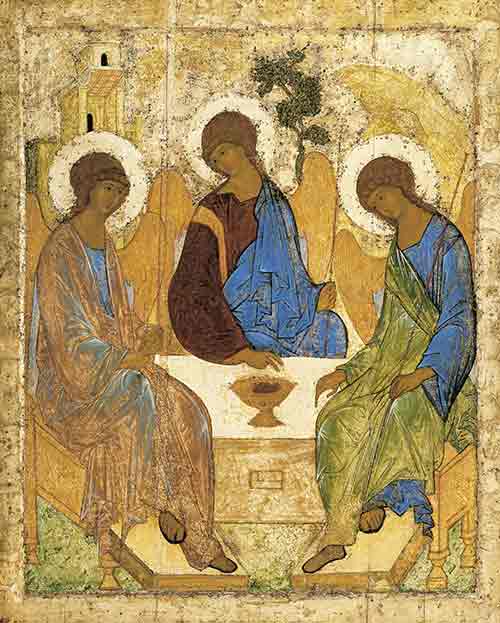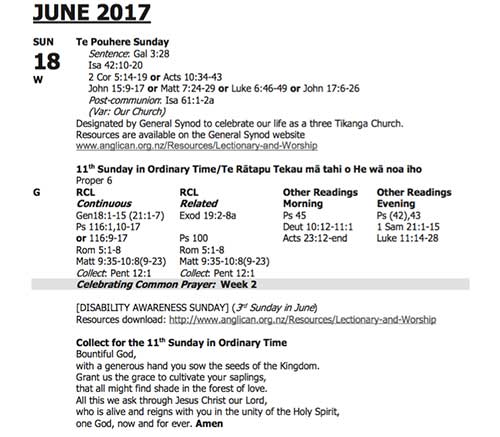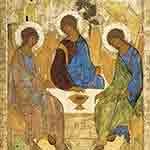
Let us pray (in silence) [that we grow in unity with God – the source of all good]
pause
O God,
the strength of all who hope in you,
mercifully accept our prayers,
and, because through the weakness of our mortal nature
we can do nothing without you,
grant us the help of your grace,
that in following your commands
we may please you in desire and in deed;
through Jesus Christ, our Saviour
who is alive with you,
in the unity of the Holy Spirit,
one God, now and for ever.
Amen.
This collect (opening prayer) is held in common among Roman Catholics, Anglicans, and others. We have been praying this prayer for at least thirteen centuries. Different Christian communities now use it on different days – the majority use it this coming Sunday.
This collect will be added to my Book of Prayers in Common.
Click on this link to find my history, commentary, and reflection on this collect: Ordinary 11.
As usual, a plethora of resources is available at Textweek.
Anglican Church of Or

No – the above image is not a parody! It is the actual entry in the NZ Anglican Lectionary booklet for Sunday 18 June. And wait – there could be more, as a lot of NZ Anglican Churches will actually ignore these options and celebrate Corpus Christi instead.
And then there’s the numbering system. According to our NZ formularies, Ordinary Time begins after Candlemas (2 Feb) for NZ Anglicans which made Sunday, 5 Feb 2017, New Zealand’s FIRST Sunday in Ordinary Time, and… (count them yourself)… I think that makes this coming Sunday the FIFTH Sunday in our Ordinary Time. Or perhaps it is the 25th of June that is actually our FIFTH Sunday in our Ordinary Time. Who knows?!
Te Pouhere Sunday
My own position is: as much as possible, stay with the internationally-ecumenically-agreed readings. So if you are going to “celebrate our life as a three Tikanga Church”, you can do so with the RCL readings:
Genesis 18:1-15, (21:1-7) – the story of Three-in-One has obvious connections with the three Tikanga
Psalm 116:1-2, 12-19 connects to the Treaty of Waitangi in paying our vows – and then there’s the Church’s Constitution
Exodus 19:2-8a is about how God wants us to live as a nation – and imaging that as church
Psalm 100 we, together, are all God’s
Romans 5:1-8 Reconciliation has obvious connections
Matthew 9:35-10:8, (9-23) is about peace and unity – and the opposite
Rev. Adrienne Bruce, a senior priest in our Church, recently publicly called my suggestion to stay with RCL on Te Pouhere Sunday “short-sighted & arrogant and culturally disrespectful“. I stand by my position. If people want to remove the option of RCL from this Sunday so that Te Pouhere Sunday takes precedence, they will have to go through the normal processes of changing our formularies in General Synod Te Hinota Whanui.
Whilst some “have had no trouble accessing the on-line resources“, others keep contacting me that when they go to the Lectionary’s link, http://www.anglican.org.nz/Resources/Lectionary-and-Worship, they find essentially an empty page. The resources can, in fact, be found by clicking on the link “Special Days” and scrolling down. So the actual URL is: http://www.anglican.org.nz/Resources/Lectionary-and-Worship/Special-Days. [Aside – it is easy enough to create a URL that is short and memorable; here is my gift to the Church for those who want a better link: tinyurl.com/TePouhere Try it.]
Furthermore, I am also receiving requests for what psalm goes with Te Pouhere Sunday proper? Please, can someone put a comment below answering that question.
Similarly, people cannot see the resources for another option for this coming Sunday: Disability Awareness Sunday. Again, these are actually not on the lectionary-booklet-provided link but on http://www.anglican.org.nz/Resources/Lectionary-and-Worship/Special-Days. Once there, you will see that the Anglican Church of Or provides for the option that “it is recommended Disability Awareness is deferred to 4th Sunday, June 24”. [It think, by this they mean June 25 – there is no Sunday, June 24 this year.]
Others, of course, will be transferring the celebration of Corpus Christi from this coming Thursday to Sunday. And others still will be celebrating St Barnabas – Trinity Sunday had precedence over that last Sunday.
If you appreciated this post, remember to like the liturgy facebook page, use the RSS feed, and sign up for a not-very-often email, …




Hi Bosco,
In your introduction above, the most salient point regarding this whole debate is that those who wish to cause Te Pouhere to have precedence should demonstrate their commitment by following “the normal processes of changing our formularies in General Synod Te Hinota Whanui.” It is not a matter for us to fall-out over. We have processes, they should be used.
As to the comments by Rev Adrienne Bruce, I am concerned, not so much by her intemperate language (which has no place in the civilized blogosphere) but by the fact that it took her three years to respond to your original post. You posted your thoughts in June 2014, she and Rev Elizabeth Snowsill responded June 2017. Am I missing something?
Thanks, Peter. We are on the same page. You know me well enough to know that I try and facilitate an environment of light over heat – sometimes it is difficult to judge what to do with “strong” comments. We are having some on the Liturgy Facebook page on accepting gays. It is sometimes a difficult juggle whether a comment is ad hominem, and should be removed (or not let through moderation), or not. I write this comment after working with our whole community to learn our new waiata commissioned for our community and gifted to us as a taonga in a special Mihi Whakatau ceremony attended by Pihopa o Te Waipounamu and the Tikanga Pakeha Bishop of Christchurch. I will preach on the meaning of the Waiata soon. This, I think, is Te Pouhere in practice. Arohanui!
And do the Rt Revs Richard Wallace and Victoria Matthews know they are hanging out with someone whose views are “short-sighted & arrogant and culturally disrespectful“?
Shame on them! They need to be aware that it is all too easy to become like those whose company they keep.
Keep smiling Bosco. I imagine the college’s new waiata is beautiful (not to mention theologically sound).
What was particularly delightful, Peter, was to hear the fluent Te Waipounamu pronunciation of Te Reo. Blessings.